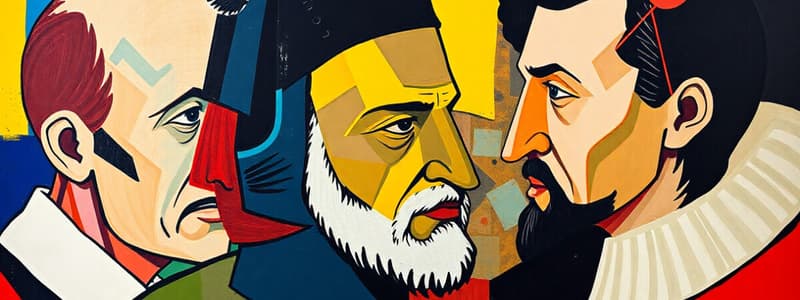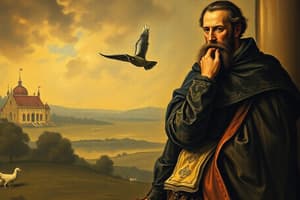Podcast
Questions and Answers
Qual è la concezione di Machiavelli riguardo alla natura del potere?
Qual è la concezione di Machiavelli riguardo alla natura del potere?
- Il potere deve essere utilizzato solo per il bene comune.
- Il potere deve essere guidato da principi morali.
- Il potere è sacro e divinamente stabilito.
- Il potere è legittimato dalla stabilità e dall'ordine. (correct)
Qual è la principale innovazione di Machiavelli rispetto alla tradizione medievale?
Qual è la principale innovazione di Machiavelli rispetto alla tradizione medievale?
- La distinzione netta tra politica e morale. (correct)
- L'inclusione di principi religiosi nella politica.
- L'affermazione che i principi morali sono universali.
- L'idea che il sovrano debba essere un guida spirituale.
In che modo Machiavelli definisce il concetto di 'virtù'?
In che modo Machiavelli definisce il concetto di 'virtù'?
- Come attitudine morale e etica del sovrano.
- Come abilità di adattarsi alle circostanze. (correct)
- Come un presupposto divino per governare.
- Come un valore assoluto legato alla giustizia.
Qual è il ruolo attribuito alla 'fortuna' nel pensiero machiavellico?
Qual è il ruolo attribuito alla 'fortuna' nel pensiero machiavellico?
Qual è l'importanza dello Stato nel pensiero di Machiavelli?
Qual è l'importanza dello Stato nel pensiero di Machiavelli?
Quale delle seguenti affermazioni descrive meglio la 'verità effettuale della cosa' di Machiavelli?
Quale delle seguenti affermazioni descrive meglio la 'verità effettuale della cosa' di Machiavelli?
In che modo Machiavelli affronta la questione della moralità nella politica?
In che modo Machiavelli affronta la questione della moralità nella politica?
Qual è la visione di Machiavelli riguardo agli uomini e alla società?
Qual è la visione di Machiavelli riguardo agli uomini e alla società?
Quale elemento è considerato cruciale per la costruzione dello Stato moderno secondo Machiavelli?
Quale elemento è considerato cruciale per la costruzione dello Stato moderno secondo Machiavelli?
Qual è il principio che giustifica le azioni politiche del principe secondo Machiavelli?
Qual è il principio che giustifica le azioni politiche del principe secondo Machiavelli?
Che ruolo ha la sovranità nel concetto di Stato secondo Machiavelli?
Che ruolo ha la sovranità nel concetto di Stato secondo Machiavelli?
Qual è l'idea fondamentale che distingue la politica dalla morale secondo Machiavelli?
Qual è l'idea fondamentale che distingue la politica dalla morale secondo Machiavelli?
Cosa implica il concetto di 'fine giustifica i mezzi' nel pensiero politico di Machiavelli?
Cosa implica il concetto di 'fine giustifica i mezzi' nel pensiero politico di Machiavelli?
Qual è l'importanza di un Stato unitario secondo Machiavelli?
Qual è l'importanza di un Stato unitario secondo Machiavelli?
Quale delle seguenti affermazioni rappresenta l'eredità di Machiavelli nello Stato moderno?
Quale delle seguenti affermazioni rappresenta l'eredità di Machiavelli nello Stato moderno?
Secondo Machiavelli, qual è il compito del sovrano riguardo alla legge e all'ordine?
Secondo Machiavelli, qual è il compito del sovrano riguardo alla legge e all'ordine?
Quale pensatore successivo è stato influenzato dalle idee di Machiavelli?
Quale pensatore successivo è stato influenzato dalle idee di Machiavelli?
In che modo Machiavelli considera il potere nell'ambito dello Stato?
In che modo Machiavelli considera il potere nell'ambito dello Stato?
Qual è una conseguenza della separazione tra politica e morale secondo Machiavelli?
Qual è una conseguenza della separazione tra politica e morale secondo Machiavelli?
Quale affermazione meglio descrive la differenza tra la visione medievale dello Stato e quella di Machiavelli?
Quale affermazione meglio descrive la differenza tra la visione medievale dello Stato e quella di Machiavelli?
Quale dei seguenti aspetti non è comune al pensiero politico medievale?
Quale dei seguenti aspetti non è comune al pensiero politico medievale?
Come si differenzia la concezione dell'uomo tra il pensiero politico medievale e quello di Machiavelli?
Come si differenzia la concezione dell'uomo tra il pensiero politico medievale e quello di Machiavelli?
Quale delle seguenti affermazioni evidenzia il ruolo della religione nel pensiero medievale?
Quale delle seguenti affermazioni evidenzia il ruolo della religione nel pensiero medievale?
Qual è la differenza principale tra l'uso della forza nel pensiero politico medievale e in quello di Machiavelli?
Qual è la differenza principale tra l'uso della forza nel pensiero politico medievale e in quello di Machiavelli?
Flashcards
Necessità come giustificazione dell'azione politica
Necessità come giustificazione dell'azione politica
La necessità di proteggere e consolidare il proprio potere giustifica le azioni del principe, anche quelle moralmente discutibili.
Il Principe come sovrano assoluto
Il Principe come sovrano assoluto
Il principe deve avere pieno controllo per garantire la sicurezza e la prosperità dello Stato.
Sovranità e unità dello Stato
Sovranità e unità dello Stato
La creazione di uno Stato unitario e solido è l'obiettivo politico massimo.
Importanza della legge e dell'ordine
Importanza della legge e dell'ordine
Signup and view all the flashcards
Il "fine giustifica i mezzi"
Il "fine giustifica i mezzi"
Signup and view all the flashcards
Distinzione tra politica e morale
Distinzione tra politica e morale
Signup and view all the flashcards
Nuova concezione del potere
Nuova concezione del potere
Signup and view all the flashcards
Potere legittimato dall'ordine e dalla stabilità
Potere legittimato dall'ordine e dalla stabilità
Signup and view all the flashcards
Politica come scienza
Politica come scienza
Signup and view all the flashcards
Contributo allo Stato moderno
Contributo allo Stato moderno
Signup and view all the flashcards
Chi è Niccolò Machiavelli?
Chi è Niccolò Machiavelli?
Signup and view all the flashcards
Come il contesto storico ha influenzato Machiavelli?
Come il contesto storico ha influenzato Machiavelli?
Signup and view all the flashcards
Qual è il realismo politico di Machiavelli?
Qual è il realismo politico di Machiavelli?
Signup and view all the flashcards
Come Machiavelli ha cambiato la politica?
Come Machiavelli ha cambiato la politica?
Signup and view all the flashcards
Qual è il ruolo del principe secondo Machiavelli?
Qual è il ruolo del principe secondo Machiavelli?
Signup and view all the flashcards
Come Machiavelli vede la fortuna e la necessità?
Come Machiavelli vede la fortuna e la necessità?
Signup and view all the flashcards
Quale è l'impatto del realismo politico di Machiavelli?
Quale è l'impatto del realismo politico di Machiavelli?
Signup and view all the flashcards
Cosa significa 'virtù' per Machiavelli?
Cosa significa 'virtù' per Machiavelli?
Signup and view all the flashcards
Cosa distingue la politica dalla morale secondo Machiavelli?
Cosa distingue la politica dalla morale secondo Machiavelli?
Signup and view all the flashcards
Cosa implica il concetto di 'fortuna' di Machiavelli?
Cosa implica il concetto di 'fortuna' di Machiavelli?
Signup and view all the flashcards
Legittimità del potere: Dio vs. Ordine
Legittimità del potere: Dio vs. Ordine
Signup and view all the flashcards
Ruolo della religione nella politica
Ruolo della religione nella politica
Signup and view all the flashcards
Scopo della politica: ordine morale vs. stabilità
Scopo della politica: ordine morale vs. stabilità
Signup and view all the flashcards
Virtù del sovrano: morale vs. pragmatismo
Virtù del sovrano: morale vs. pragmatismo
Signup and view all the flashcards
Politica e morale: intrecciate vs. separate
Politica e morale: intrecciate vs. separate
Signup and view all the flashcards
Study Notes
Machiavelli and the Modern State
- Niccolò Machiavelli (1469-1527) is considered a founder of modern political science.
- His context – a fragmented and conflict-ridden Italy – profoundly influenced his thought.
- Key works include The Prince and Discourses on Livy, analyzing politics and state management critically and realistically.
- He broke from medieval tradition, focusing on practical effectiveness and real-world power, rather than divine or moral principles.
Machiavellian Political Realism
- Machiavelli believed in "the effective truth of things"—politics should reflect how people actually behave, not how they should.
- This approach emphasizes a new concept of power, driven by necessity and convenience, not religious or moral principles.
- This realism is central to the development of the modern state, where authority isn't solely based on divine right but on the ruler's ability to maintain order and stability.
The Centrality of the State
- Machiavelli separated politics from morality and religion, establishing politics as a distinct field.
- The prince (ruler) is the central figure in maintaining state stability and unity.
- "Virtù," for Machiavelli, isn't ethical but the ability to adapt to circumstances and act pragmatically.
- The state's autonomy is paramount.
The Role of Fortune and Necessity
- Fortune (chance) and virtù interact in human affairs.
- A strong leader should control fortune with their virtù.
- Necessity (urgent need) justifies actions that might be morally questionable to protect and strengthen the state.
- These ideas connected state power with a pragmatic approach.
The Concept of Sovereignty
- Machiavelli envisioned a sovereign ruler with absolute control.
- This concept anticipates the modern understanding of sovereignty.
- A unified, strong state is the highest political aspiration.
- Maintaining order and law is vital, laying the groundwork for a centralized state.
- This anticipates the secular and self-governing nature of the modern state.
The Reform of Political Morality
- Machiavelli, though not explicitly, suggests the "ends justify the means."
- Political action should be judged by its practical effectiveness in serving the state's needs, not by moral standards.
- This separation of political and moral spheres is crucial to the development of a modern, secular state.
Machiavelli's Legacy
- Machiavelli's work significantly influenced later political thinkers, particularly notable figures such as Thomas Hobbes, Jean Bodin, and Jean-Jacques Rousseau. Each of these theorists integrated aspects of Machiavelli's pragmatic insights into governance and authority into their own philosophical frameworks, creating a rich tapestry of political thought that continues to resonate today.
- His ideas contributed to the understanding of the modern state as an autonomous and sovereign entity, emphasizing that a state must possess ultimate authority over its affairs, independent from outside interference, including from religious or external political bodies which could undermine its sovereignty and stability.
- The emphasis Machiavelli placed on a pragmatic and realist approach to politics laid a crucial foundation for modern political thought. By prioritizing practical outcomes over idealism, he encouraged leaders to focus on effective governance rather than being mired in ethical considerations that might hinder their ability to maintain power and secure the state.
- The idea of a secular state, where governance is separated from religious influence, with a strong emphasis on the effective administration of power, is a key element of Machiavelli's legacy. He argued that religion should not dictate political action, which opened the door for the establishment of more secular political systems that could operate independently of religious dogmas.
- Machiavelli’s ideas are intrinsically linked to the concept of the state as a self-governing entity that is maintained through its sovereignty and ability to operate without dependency on religious authorities. This progressive view shaped the discourse on statecraft and governance, ultimately encouraging the evolution of modern political institutions that value secular authority.
Studying That Suits You
Use AI to generate personalized quizzes and flashcards to suit your learning preferences.




